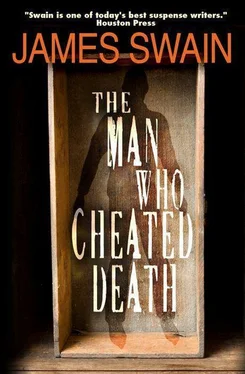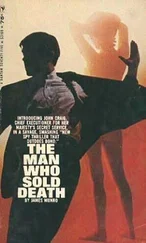“Thanks for the quick turnaround,” Wondero said.
“Anytime, Harry.”
As Tate started to walk out the door, Wondero stopped him.
“Did you ask the principal if he recalled any male students with psychiatric problems?” Wondero asked.
Halting, Tate said, “Come to mention it, I did. I asked him if any student had really stuck out. He said society produces a lot of bad seeds, some worse than others. I asked him to explain, and he said he had a meeting to go to.”
“Are you sure that was the expression he used? Bad seeds?”
“Yup. It struck me as funny, too.”
“Think he was hiding something?”
The black detective rubbed his chin. “Maybe.”
“How many years has he been principal of that school?”
“I think he said over thirty.”
“That’s a long time. Yet he couldn’t cough up a single name of a bad student. That strike you as odd?”
“Yeah, it did.”
“You better give me his name and number,” Wondero said.
Tate took a piece of paper from his wallet. “Here you go.”
“Do you think the principal is hiding something?” Hardare asked when the black detective was gone.
“That would be a fair assumption.” Wondero took out his cell phone and punched in the number Tate had given him. “The trick is going to get him to open up.”
The call went through, and Wondero began speaking with the principal down in San Diego. Hearing a noise, Hardare turned to see Crystal standing in the doorway to her bedroom, her face awash with tears. He went and put his arms around her.
“I thought you were sleeping,” he said.
“Have they found Jan?” she asked.
“Not yet. You need to lie down, and rest.”
“I can’t. Every time I close my eyes, I see his face. He’s not normal, Dad. There’s something wrong with him.”
“I know, Crys. He’s sick in the head.”
“No, I mean there’s something physically wrong with him.”
His daughter was telling him something important. Clasping her shoulders, he looked her in the eye. “What did you see?”
“His hat and sunglasses flew off when Jan was fighting with him. He doesn’t have any hair on his head. No eyebrows or eyelashes or any facial hair. That’s not normal, is it?”
“Maybe he shaved his hair away.”
“He doesn’t have any hair on his chest, either.”
“How do you know that?”
“Right before he shot the cab driver, he pulled up the front of his shirt to draw his gun, and I saw his chest. It was hairless. Guys always have hair on their chests, don’t they?”
“Usually.”
“Death doesn’t. He’s got something wrong with him. You need to tell the police.”
He gave his daughter another hug. “Okay, honey, I will. Promise me you’ll lie down, and get some rest.”
She said okay, and returned to her room. Hardare shut the bedroom door, and crossed the suite to where Wondero stood. The detective had finished his call, and had his car keys out.
“The principal agreed to meet with me this afternoon,” Wondero said. “Tate was right. He knows something.”
“Good,” Hardare said. “I’m going with you.”
“I’m sorry, Vince, but I can’t do that. It would compromise the investigation.”
“I don’t care about that,” Hardare said. “You dragged me and my family into this mess. I have a right to go.”
The remark made Wondero wince. To his partner he said, “You mind staying here, and watching the girl?”
“Not at all,” Rittenbaugh replied.
Wondero nodded and headed for the door.
“Time’s a wasting. Let’s go.”
Chapter 20
The Early Years
Woodrow Wilson high school was located due west of the Miramar Naval Air Station in a densely populated area called Miramar. Home of the Red Warriors, boasted a billboard just past the exit on Interstate 15. State Football Champions 2006, 2008, 2010 201?????? No, not in 2011, Wondero thought, coming off the exit ramp. In 2011, the Trojans were going to be state champs.
A security guard flagged them down inside the school parking lot. “We’re here to see Dr. Bridgewater,” Wondero explained, flashing his badge.
“Dr. Bridgewater is on the second floor, room 206,” the guard said, pointing to a spot marked Visitors Only near the entrance of an imposing red brick building. “Have a nice day.”
School was in session, and there were kids everywhere they looked. As they headed inside, Hardare wondered how many students had gone to school here during the past twenty-five years. Forty thousand, maybe fifty? What where their chances of finding one bad seed? Not good, he realized, but they still had to look.
They found the stairway. On the second floor landing, three teenagers sat on the floor, giggling to themselves. Wondero flashed his badge and one of the boys directed them to Bridgewater’s office, managing twice to call Wondero sir.
“You like doing that, don’t you?” Hardare said.
“It opens a lot of doors,” Wondero admitted.
Room 206 was at the end of a long hallway, and did not look like a walk any student would enjoy taking. They entered the office to find a disagreeable secretary guarding her boss’s door.
“Dr. Bridgewater is on a conference call, and cannot be disturbed,” the secretary explained.
Wondero hung his badge inches from her nose. She used the tip of her plastic fingernail to tap the inscription. “You’re out of your jurisdiction,” she said matter-of-factly.
“We have an appointment. It’s urgent we see him right now.”
She pressed the intercom on her desk. “Dr. Bridgewater, there are two men from the LAPD here to see you.”
Over the intercom a man’s voice said, “Give me two minutes.”
“Have a seat,” the secretary said.
The couch in the waiting area sagged beneath their combined weight. Hardare picked up an old yearbook from a coffee table and leafed through it. He came to a page with a photograph of Dr. Louis Bridgewater taken before Bridgewater was principal, and had been head of the school’s guidance counselors.
“Excuse me,” Hardare said to the secretary. “What field of medicine is Dr. Bridgewater a doctor of?”
“Psychiatry,” she said.
A few minutes later, Bridgewater came out of his office with an angry-looking teenage boy. Showing the boy to the door, he turned to greet his guests.
“Sorry for the delay,” Bridgewater said.
They entered his office. It was filled with expensive furniture and lots of diplomas. Bridgewater motioned to a pair of chairs while sitting down at his desk. He nervously interlaced his fingers together before speaking.
“You realize that, by law, I should refer you to the school attorney.”
“I understand that,” Wondero said. “Unfortunately, we don’t have much time. Mr. Hardare’s wife was kidnapped this morning, and we believe the culprit once attended your school.”
“I’m sorry to hear that,” Bridgewater said. “All right, I’ll try to help. Can you give me a description of your suspect?”
“White male, between twenty-five and forty-five years old, with classic sociopathic tendencies,” Wondero replied.
“Violent?”
“Very. His victims are all women.”
“And you think he went to school here sometime during the past twenty years.”
“Correct.”
Bridgewater opened up a file cabinet behind his desk. “The California school system currently uses MOSIAC to weed out problem children in our classrooms. Before MOSIAC, we employed Macdonald’s triad. Are you familiar with this?”
“Afraid not,” Wondero said.
“Macdonald believed homicidal maniacs share three similar childhood characteristics. Bed-wetting, starting fires, and torturing small animals. I know it sounds primitive, but those were the traits we looked for years ago.” Bridgewater tossed a file on his desk and closed the cabinet. “This file contains evaluations of students that fit the MacDonald triad, or what we used to call bad seeds. I was the school psychiatrist back then, and they were my patients. I’d be happy to look through the evaluations, and see if anyone matching your profile pops up.”
Читать дальше












